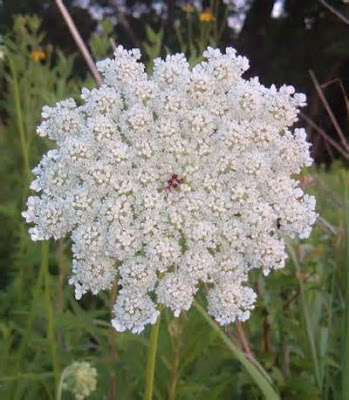There were cars and trucks parked around the demo gardens Friday morning as Master Gardeners worked in the perennial, herb and Gass House gardens.
 |
| Herb Garden - April 2013 |
Planting, mulching and watering happened in the herb garden. Trailing germander (Teucrium Chamaedrys ‘Prostratum’) was pulled from the holding area and planted along the edge of one of the front beds. This is also known as the "poor man's boxwood” and is often seen at the edges in knot gardens or formal garden beds.
 |
| Trailing Germander |
 |
| Sweet Annie (Artemisia annua) |
Sweet Annie (Artemisia annua), used in making wreaths, potpourri and sachets, was planted. The leaves from mugwort (Artemisia vulgaris), pulled from the pollinator garden on Monday, are an excellent insect repellent and can be added to sachets for linen or clothes closets.
Globe amaranth plants (Gomphrena haageana ‘Strawberry Fields’) were added. The red globe amaranth adds bright red to any wreath or dried crafts and can be used as visual additions to dry potpourris.
 |
| Globe Amaranth |
The garden includes violets, used for dried flower crafts, and lemon thyme (Thymus citriodorus) used for potpourris.
 |
| Violet |
Also added were both red and yellow yarrow (Achillea millefolium) used in wreaths, arrangements and potpourris.
 |
| Yarrow 'Paprika' (L) and Yarrow 'Schwellenberg' (R) |
Queen Anne’s Lace (Daucus carota) is used for arrangements, wreaths and as a visual to dry potpourris. Presumed to be named after Anne, Queen of Great Britain, the flower resembles lace. Although the tiny red center flower is thought to be a blood droplet where Anne pricked herself making lace, it is actually a flower colored by anthocyanin which attracts insects.
 |
| Queen Anne's Lace (Daucus carota) |
Other plants to be planted in the near future are baby’s breath (Gypsophilia), lavender cotton/santolina (Santolina chamaecyparissus), celosia, curry plant (Helichrysum italicum), scented geraniums, another scented thyme and Iris germanica var. florentina, also known as orris root, a fixative for scents in potpourris and cosmetics.
 |
| Curry Plant |
This garden is a bit of a challenge as many of the plants are not commonly found in gardens. The binomials of some plants include “tinctor …” meaning to tint or dye. On order are madder (Rubia tinctorum), woad (Isatis tinctoria), dyer’s chamomile (Anthemis tinctoria) and indigo (Indigofera tinctoria). Only a goldenrod (Solidago spp.), claimed from the pollinator garden, has been planted so far. Also planned are yarrow (Achillea), zinnias (Zinnia spp.), marigolds (Targetes spp.), saffron crocus (Crocus sativa) and a centerpiece plant, dyer’s broom (Genista tinctoria).
 |
| Dyer's Broom |
Stay tuned for more on the herb garden as the weather turns warmer and the seedlings from the greenhouse can be moved to the various beds.

No comments:
Post a Comment